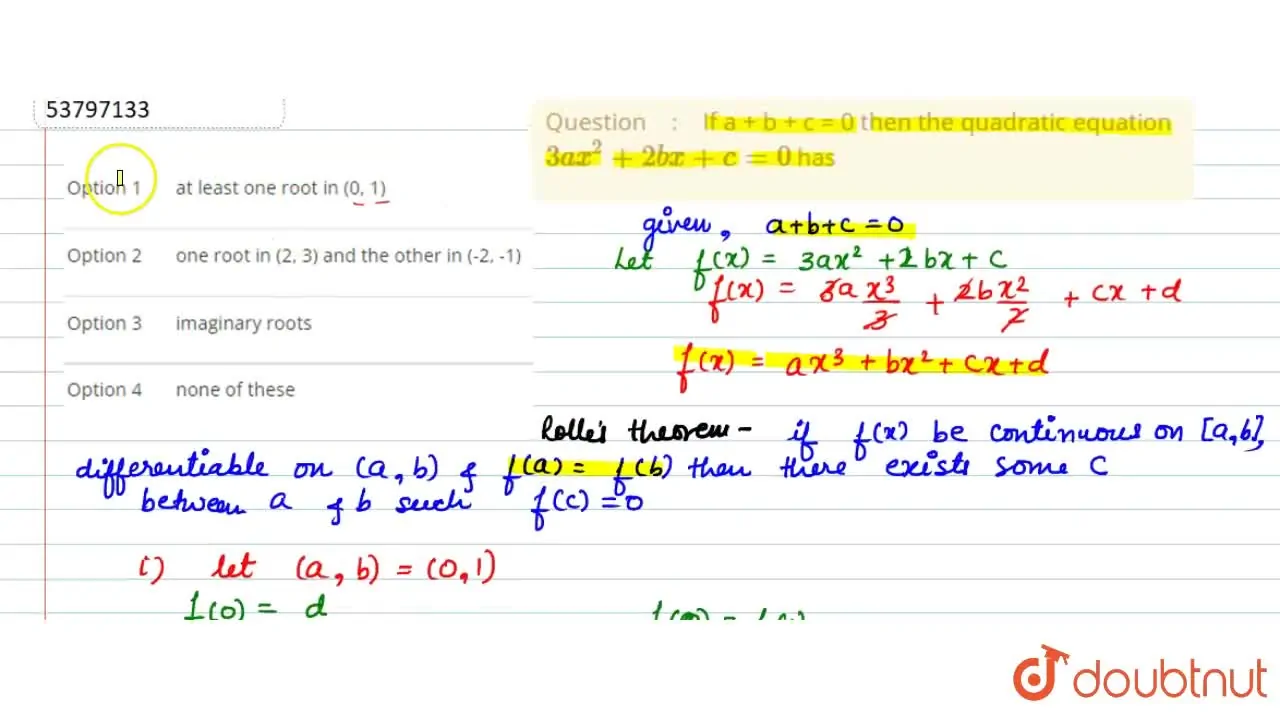If a + b + c = 0 then the quadratic equation 3ax2+2bx+c=0 has
at least one root in (0, 1)
one root in (2, 3) and the other in (-2, -1)
imaginary roots
none of these
The correct Answer is:A
Consider the function ϕ(x)=ax3+bx2+cx. Obviously ϕf(x), being a polynomial, is every where continous and differentiable
Also, ϕ(0)=0,ϕ(1)=a+b+c=0 [Given]
Therefore, by Rolle's Theorem there exists a point λ∈(0,1) such that ϕ'(λ)=0.
We have, ϕ'(x)=3ax2+2bx+c
∴ ϕ'(λ)=0
⇒ 3aλ2+2bλ+c=0
⇒ λ is a root of 3ax2+2bx+c=0.
Thus, 3ax2+2bx+c=0 has a root in (0, 1).
Related Playlists
- BOOK - OBJECTIVE RD SHARMACHAPTER - QUADRATIC EXPRESSIONS AND EQUATIONS EXERCISE - Section I - Solved Mcqs123videos
QUADRATIC EXPRESSIONS AND EQUATIONS
- BOOK - OBJECTIVE RD SHARMACHAPTER - QUADRATIC EXPRESSIONS AND EQUATIONS EXERCISE - Section II - Assertion Reason Type22videos
QUADRATIC EXPRESSIONS AND EQUATIONS
- BOOK - OBJECTIVE RD SHARMACHAPTER - PROBABILITY EXERCISE - Chapter Test45videos
PROBABILITY
- BOOK - OBJECTIVE RD SHARMACHAPTER - SEQUENCES AND SERIESEXERCISE - Chapter Test60videos
SEQUENCES AND SERIES
Similar Questions
If a+b + c = 0, then show that the quadratic equation 3ax2+2bx+c=0 has at least one root in [0,1].
View SolutionIf 2a+3b+6c+0(a,b,c∈R) then the quadractic equation ax2+bx+c=0 has
View Solutiona,b,c,∈R,a≠0 and the quadratic equation ax2+bx+c=0 has no real roots, then which one of the following is not true?
View SolutionIf a,b,c∈Randa+b+c=0, then the quadratic equation 3ax2+2bx+c=0 has (a) at least one root in [0,1] (b) at least one root in [1,2] (c) at least one root in [32,2] (d) none of these
View SolutionLet a,b,c∈Randa≠0 be such that (a+c)2<b2 ,then the quadratic equation ax2+bx+c=0 has
View SolutionIf a,b,c∈Randa+b+c=0, then the quadratic equation 4ax2+3bx+2c=0 has
View SolutionIF a,b,c are real distincr numbers such that a3+b2+c3=3abc, then the quadratic equation ax2+bx+c=0 has
View SolutionIf a, b, c ∈R and 2a + 3b + 6c = 0, then the equation ax2+bx+c=0 has
View SolutionLet a, b and c bereal numbers such that 4a+2b+c=0 and ab > 0. Then the quadratic equation ax2+bx+c=0 has
View SolutionThe coefficients a, b and c of the quadratic equation, ax2+bx+c=0 are obtained by throwing a dice three times. The probability that this equation has equal roots is:
View Solution


